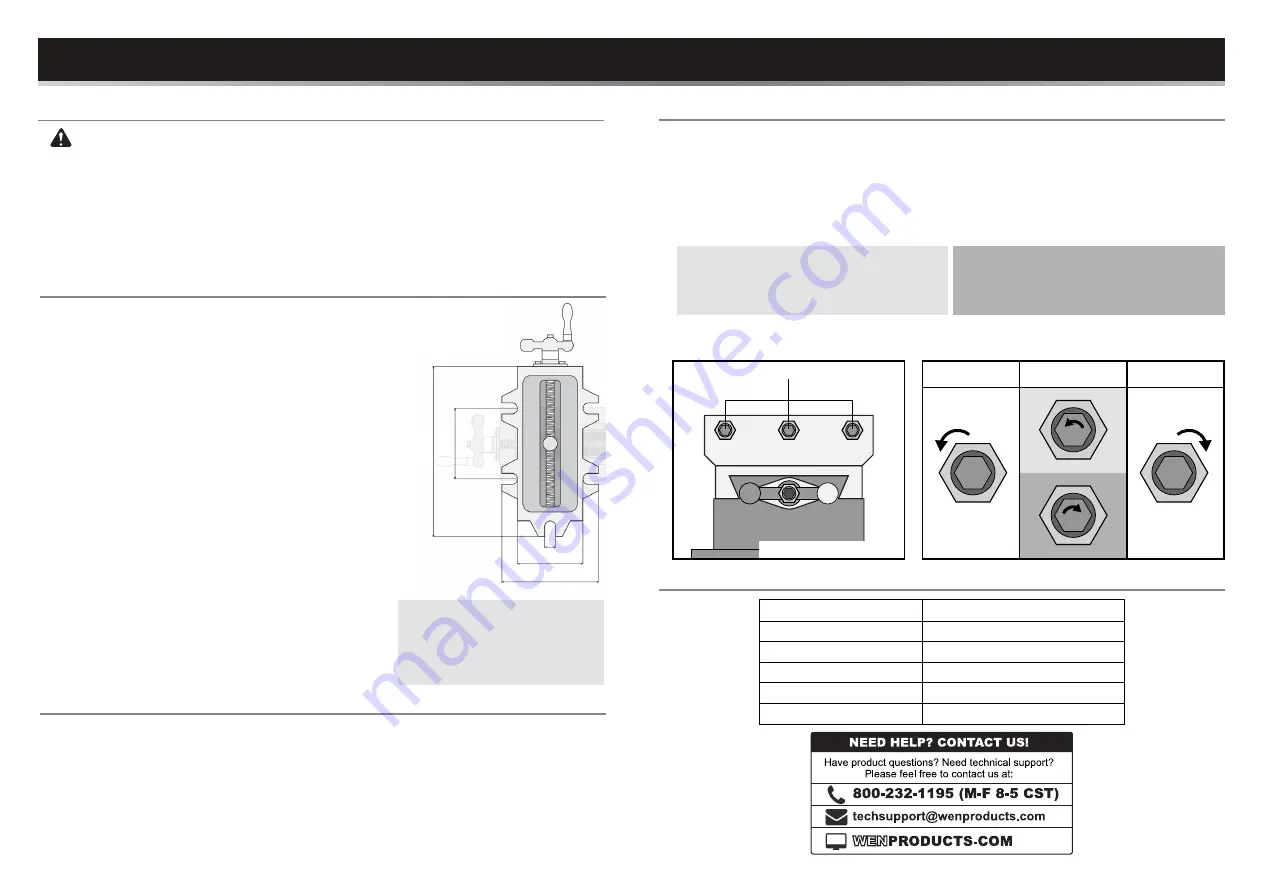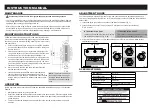
INSTRUCTION MANUAL
ADJUSTMENT GUIDE
Your vise comes pre-adjusted from the factory, and should not require adjustment. However, if
the cross or longitudinal slides (Parts 1 & 16) are too tight or too loose, follow the steps below to
adjust them.
1. Locate the three gib screws on the side of the slide in question (Fig. 3).
2. Loosen the three hex nuts (Part 5), using a 10 mm wrench or socket (not included).
(Fig. 4 - Step 2)
MAINTENANCE
Acetone may irritate the skin. Wear gloves and eye protection when using acetone.
• Your vise comes with a layer of anti-rust protective coating on the machined surfaces. Remove
this coating with a clean cloth moistened with acetone, then protect the machined surfaces by
applying a light coat of good-quality paste wax.
• After using your vise, wipe it off with a cloth to ensure that no chips, shavings, or other debris
get into the way of your vise. Keep your vise clean. Periodically check the ways of the vise to
ensure that they are not blocked or damaged by chips, shavings, or other debris.
Gib Screws
3.
IF THE SLIDE IS TOO TIGHT
• Loosen the set screws (Parts 6 & 23) using
the included hex wrench (Fig. 4 - 3A).
IF THE SLIDE IS TOO LOOSE
• Tighten the set screws (Parts 6 & 23) using
the included hex wrench (Fig. 4 - 3B).
4. Using the 10 mm wrench or socket, tighten the hex nuts (Part 5) back down. Make further
adjustments as needed.
Step 2
Step 3
B
A
Step 4
Fig. 3
Fig. 4
Side View
NOTE:
To prevent the bolt from
loosening over time, use split
locking washers between flat
washers, or use nylon locking
nuts.
MOUNTING INSTRUCTIONS
OPERATION
Follow the instructions below to safely and securely mount your
cross vise to a stable workbench. Mounting your vise eliminates
the risk of your vise moving or falling, allowing for more accuracy
and user safety.
1. Select a secure worktop to which your vise will be mounted,
such as a workbench. The workbench should be sturdy and
fixed to the floor.
2. Find the best location on your worktop to mount your vise.
It is good to select a spot that allows access to both crank
handles, as well as the vise clamping handle (Part 14).
3. Once you have selected where you want to mount your vise,
use a pencil to mark the holes where the vise will be bolted
(four mounting flanges are located on the base). You must
use at least two bolts that are diagonal from each other. Use
four bolts for optimum stability.
4. Move the vise to the side and use a drill to drill out the
marked spots for the bolts.
5. Line up the vise with the drilled holes. Insert bolts and
fasten. If the bolts extend through the bench, place a
washer and nut onto the end. Tighten nuts onto the bolts
using a wrench. (These bolts, washers and nuts are not
included).
Before operation, mount your vise and follow the assembly instructions on page 1 to attach the
handles.
1. Mark your workpiece for your specific job.
2. Rotate the leadscrew with handle counterclockwise to open the jaws. Place workpiece inside
of jaws in desired position. Rotate the handle clockwise to tighten the jaws and firmly secure
your workpiece.
3. To move the secured workpiece back and forth or side to side, rotate the lower and upper
handles.
SPECIFICATIONS
Jaw Capacity
6-1/8 in.
Cross Slide Travel
8.5 in.
Longitudinal Slide Travel
6.5 in.
Clamping Strength
3000 LBF
Dimensions
17 in. x 16-3/4 in. x 7-1/4 in.
Weight
57.1 lbs
0.66"
5.275"
7.69"
10.875"
6.625"




















